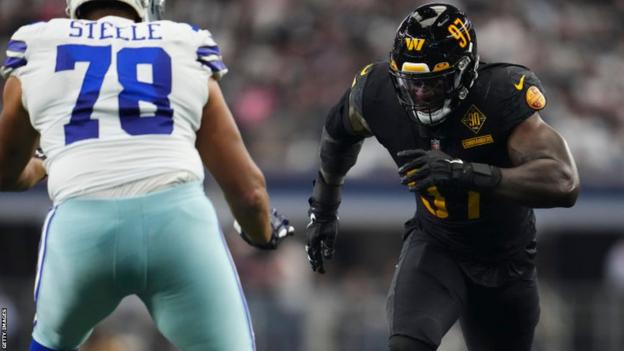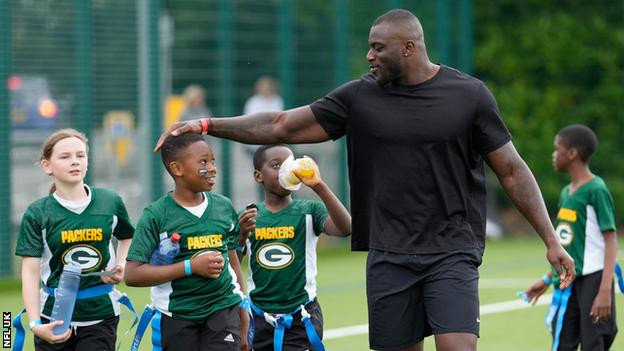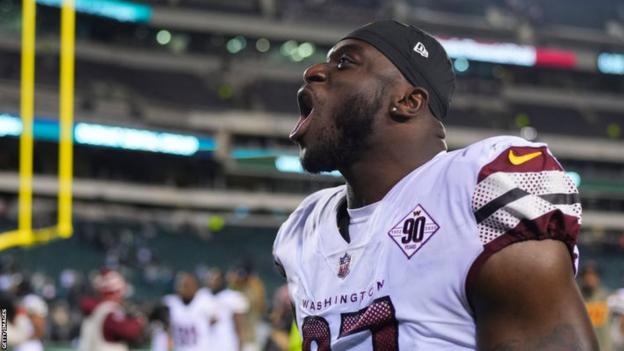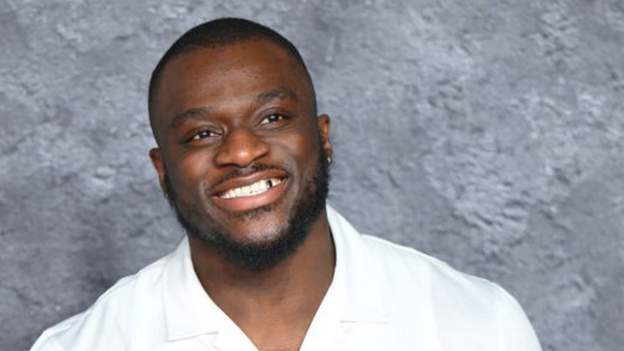Efe Obada is about to grab lunch at the NFL Academy tryouts when he stops in his tracks.
“Hang on a second,” he says, looking over his shoulder to find a teenager standing alone by the practice field.
Obada has remembered that Derry, who travelled almost 90 miles south from Leeds to Loughborough for the tryouts, has two hours to kill before his train home, so asks if he wants to join him.
And he doesn’t stop there. The Washington Commanders defensive end is about to give the NFL hopeful the experience of a lifetime.
After lunch, Derry spends an hour lifting weights with Britain’s biggest NFL star.
“I’ve told everyone,” he says later to BBC Sport. “I’m still buzzing now.”
Obada knows how it feels to be Derry. In his early 20s, he got early morning trains into London, to train in public parks before working as a security guard.
Now he’s completed his “miracle” journey to the NFL, the 30-year-old feels he would be “doing an injustice” not to use his platform to inspire others, particularly British youngsters like Derry.
In an exclusive interview, Obada tells the BBC about his troubled upbringing, his ongoing battle to feel accepted as British and the importance of keeping in touch with his Nigerian roots.
‘Growing up in foster care translates to the NFL’

Born in Nigeria, Obada moved to the Netherlands when he was eight.
Two years later, he and his sister were trafficked to the UK. They were abandoned in London and grew up in foster care. Obada feels those experiences prepared him for the ruthless world of the NFL.
He was let go by three teams before making his NFL debut in 2018. At the start of the 2020 season, he was kept on, released and re-signed all in the space of one weekend.
“The instability and uncertainty of not having a place to call home, I feel it translates,” he says. “You can be on one team – then in a moment, you can be on another.
“Living out of a suitcase is something I still do now, having this global lifestyle, and just being comfortable with being uncomfortable.”
Frustrated at a lack of opportunities, partly because of his immigration status, the younger Obada was drawn into gang culture in south London. As he tried to establish himself in the NFL, he felt as though he was “running away” from that past.
“I was an immigrant, I couldn’t work, I couldn’t further my education,” he says. “There were only a certain amount of options. Eventually you get pulled in a certain direction.
“In my heart, that’s not really who I am but your environment turns you into someone else just so you can survive and provide.
“So, given an opportunity like the NFL, something that big… even when I was in the practice squad I was making really good money that I was able to send back home. I was like ‘I’m going to hold on to this’, because I knew what was waiting for me [back in London] and I knew that was not what I wanted for myself.”
‘Until I get a passport, I feel the UK doesn’t accept me’

Obada has been a long-term supporter of the NFL Academy, flag football and the Big Kid Foundation, a London charity.
He is now looking to create a community training facility in south London yet admits he is frustrated at trying to secure a British passport, despite flying the UK flag on one of the biggest stages in world sport.
“I was in foster care and when I was a minor they were supposed to sort out my immigration and my papers for me, but I fell through the cracks,” he says.
“I aged out, rules changed, and unfortunately I was unable to get [a passport]. I’m still fighting to get it and although I do feel British, I feel as though it’s a country that doesn’t accept me.
“It does hurt a little bit, but these are the crosses and hurdles I have to bear and overcome. I have a lot of empathy because I grew up around people who had similar situations and are still in similar situations.
“They probably have more of a right to be in the country than I do because of how many years they’ve been here but are still struggling, going through solicitors and having to adjust to the rules and changes in the UK.
“I’m blessed that I have the ability to go in and out [of the UK] as I please but it’s just having that indefinite inability to call England my home and be recognised as a British citizen. Hopefully I’ll be able to sort it and it will be just a part of my life that’s behind me.”
‘I had imposter syndrome, that’s gone now’
Obada is still troubled by his past and supports mental health charity Mind, having found the courage to speak to a therapist last year.
“I felt it was impacting my life, my relationships, and I wanted to fix that,” he says. “I saw the change from going into therapy, how impactful that was for me in terms of how I treat people, how I view the world, my confidence when I play, how I deal with issues from growing up.
“In the NFL, in African communities, in lots of households – [opening up] is very taboo, especially as a man. It’s like ‘just get on with it’. There’s always this mindset of ‘oh, someone else has it worse’. I felt guilty because I’m an NFL player – what do I have to complain about?
“But [I realised] I have this platform and that I’m not alone. I need to talk about it and give people the courage to learn about the tools to help them, because it’s a huge thing.”

Obada even opened up to his Washington team-mates too, which he feels has made him “100% a better player” as he looks forward to playing a sixth active season in the NFL.
“I was scared out of my mind,” he says. “I didn’t know how it would be received, I felt so exposed and vulnerable. But that process of sharing my story, my life, my experiences, was so therapeutic.
“It also created a platform for people to share their experiences and their journey, and that was amazing.
“I learned so much about my team-mates. I was able to connect on a deeper level and it’s definitely made me more confident. It’s made me more trusting in my abilities and where I come from.
“Initially I had imposter syndrome and I feel like that’s gone. I’ve accepted who I am as a person, and I’ve kind of detached from my past and my internal voice.
“When I do get negative I now have the tools and awareness to understand that, ‘OK, I feel this way’, instead of catastrophising or spiralling into a certain place like I used to.”

